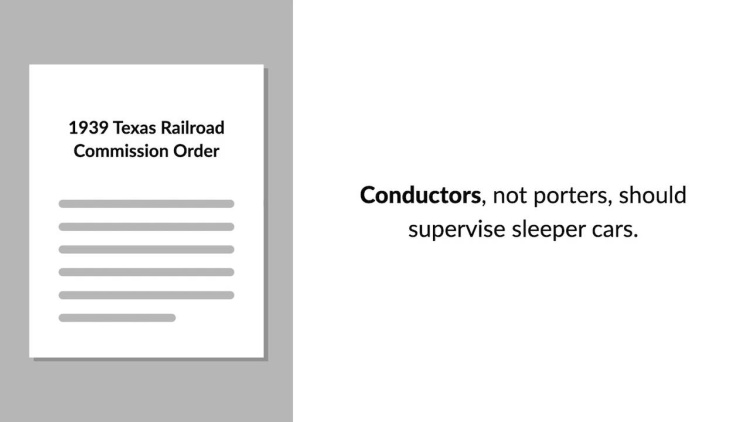Railroad Commission of Texas v. Pullman Co.
United States Supreme Court
312 U.S. 496 (1941)
- Written by Robert Schefter, JD
Facts
The Pullman Company (Pullman) (plaintiff) ran trains on Texas train tracks. The Railroad Commission of Texas (Commission) (defendant) ordered that all sleeping cars on state tracks had to be supervised by an employee with the rank of “Pullman conductor.” The order was in response to a practice of lower-ranking porters being placed in charge of sleeping cars on trains with only one sleeping car. It was well-known that porters on Pullman cars were black individuals, and Pullman conductors were white. Pullman brought suit in federal district court, seeking injunctive relief to enjoin enforcement of the Commission’s order. The complaint alleged that the order violated state law and the United States Constitution. Texas Civil Statutes, Article 6445, granted the Commission governing authority over the state railroads and included the power to prevent unjust discrimination and abuses in the conduct of the railroads. The Pullman porters intervened as plaintiffs, alleging racial discrimination. The Pullman conductors intervened in support of the Commission’s order. A three-judge panel of the district court enjoined the order, and the case was appealed directly to the United States Supreme Court.
Rule of Law
Issue
Holding and Reasoning (Frankfurter, J.)
What to do next…
Here's why 904,000 law students have relied on our case briefs:
- Written by law professors and practitioners, not other law students. 47,100 briefs, keyed to 995 casebooks. Top-notch customer support.
- The right amount of information, includes the facts, issues, rule of law, holding and reasoning, and any concurrences and dissents.
- Access in your classes, works on your mobile and tablet. Massive library of related video lessons and high quality multiple-choice questions.
- Easy to use, uniform format for every case brief. Written in plain English, not in legalese. Our briefs summarize and simplify; they don’t just repeat the court’s language.





